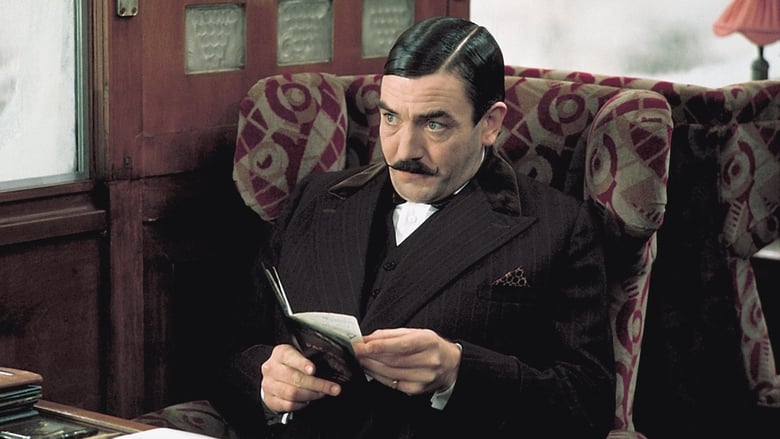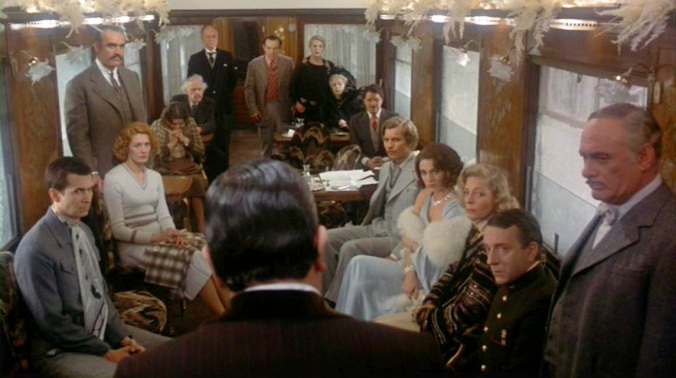← Back to Reviews

in

Murder on the Orient Express
WHY'D I WATCH IT?
Final Verdict: [Meh...]
Murder on the Orient Express
Mystery / English / 1974
WHY'D I WATCH IT?
A remake of Murder on the Orient Express is out and the original has been on my watchlist for a while. We're talkin' about Sean Connery and Michael York trapped on a train in a classic murder mystery directed by Sydney Lumet, of 12 Angry Men. It's gotta be good.
WHAT'D I THINK? *SPOILERS*
WHAT'D I THINK? *SPOILERS*
The most enjoyable mystery stories are those featuring a closed circle of suspects, these are the stories where the murder takes place at a location or time which limits the possible perpetrators to relatively small group of people, making the investigation into evidence largely secondary to taking and cross-examining testimony. These are the mysteries which fuel the likes of Sherlock Holmes, Clue, Case Closed, and the Ace Attorney series, all well known for creating suspenseful mysteries and challenging the reader, viewer, or player to solve the mystery before the detective does. It's extremely tempting to draw parallels to Sydney Lumet's 12 Angry Men here because both involve seeking justice through the cross-examination of information from a limited number of diverse and dubious characters. Taking on the elements which made 12 Angry Men great and elevating them from the deconstruction of evidence to the reconstruction of a crime sounds like a truly fantastic idea.
Sadly, this is where I sideline my optimism for an actual review.
The reason the movie Clue has 3 endings is transparently simple: They had at least 3 endings they really liked and they couldn't pick just one so they went with all of them. It's easy to imagine the difficulty in choosing between a murder mystery in which 1 person is responsible, really forcing the viewer to narrow their considerations down and commit to one suspect, win or lose, versus a murder mystery in which everyone is responsible, providing a clean narrative with no lose ends at the expense of that viewer participation. When everyone is equally credible as the murderer and no hard evidence damns any one person, the audience can't come to it's own autonomous conclusions.
While I totally understand the desire to have all of your fun characters ultimately the murderer in an OCD kinda way, in doing so you deprive the audience of what should be the biggest central selling point of your movie: solving the mystery yourself. Sure, the movie sprinkles evidence all over the place for you to form your own conclusions, but when the cups are lifted and the balls revealed, it's like finding out it was a dream all along. Nothing mattered. Your speculations and conjecture were a waste of time because everything was orchestrated from the beginning.
Granted, a third of the Clue's endings is this ending, but Clue was also a comedy, so it had that going for it much of the way. Murder on the Orient Express plays it's murder mystery straight, which forces me to compare it to other like mystery stories such as Case Closed. Case Closed is a seemingly endless anime and manga series with each installment featuring a different closed-circle mystery and a range of suspects each with their own alibis and possible motives. Most of the time, only one or two people are responsible for the murder (or faked suicide) and the series gives you most of the information up front for you to solve it. Consider for a moment what it would mean for a series like Case Closed to feature a mystery in which every suspect was in fact the murderer.

That would end the series. Or at the very least it's a gambit you couldn't pull twice without seriously jeopardizing interest in your stories. Why read when you have no incentive to try and pick out the murderer?
Now, you might argue that MotOE gave you enough information to solve the mystery and thus isn't quite the cop-out I take it to be, but really consider the leaps the movie goes to in order to draw it's conclusions. For you to solve the mystery you'd have to, independently, be familiar with the Russian alphabet, accept that "lawyers" is an Americanism for "solicitors", and apparently need only a fraction of a name on a burnt piece of paper to conclude that the person who burnt it is in fact operating under a false name and secretly a mafia gangster and murderer of the person who's name is on the paper.
Unless of course I missed something which is entirely possible because the main character speaks rapidly and in a thick accent throughout the entire movie so I pick up, what, 70-80% of the dialog?
Honestly, by design, you can't really incriminate everyone unless you specifically propose evidence suggesting that it could only have been done with everyone else's mutual knowledge. You might as well ask who DIDN'T kill the guy because you have approximately as much wiggle room to make such assertions. I mean, imagine if Poirot illustrated his second solution, accusing everyone on the train of complicity in the murder and there's like ONE GUY he's accusing who was completely in the dark. Seems totally possible to me.
I will grant that Sydney Lumet does manage to distinguish these characters similarly to how he does in 12 Angry Men, but many of their personalities and mannerisms never really manifest in the proceedings and the likes of Sean Connery and Michael York get precious little time onscreen to flex.
Honestly, if I were to point to any one particular thing I liked about MotOE it'd be the setting. Not the atmosphere, but the setting, something about an intercontinental locomotive and that time period, with all the smoke and suave suits, the bitter luxury... ah. It gets me. I wish I could've been in that time.
Though I hear Scarlet Fever wasn't too fun, so maybe not.
Sadly, this is where I sideline my optimism for an actual review.
The reason the movie Clue has 3 endings is transparently simple: They had at least 3 endings they really liked and they couldn't pick just one so they went with all of them. It's easy to imagine the difficulty in choosing between a murder mystery in which 1 person is responsible, really forcing the viewer to narrow their considerations down and commit to one suspect, win or lose, versus a murder mystery in which everyone is responsible, providing a clean narrative with no lose ends at the expense of that viewer participation. When everyone is equally credible as the murderer and no hard evidence damns any one person, the audience can't come to it's own autonomous conclusions.
While I totally understand the desire to have all of your fun characters ultimately the murderer in an OCD kinda way, in doing so you deprive the audience of what should be the biggest central selling point of your movie: solving the mystery yourself. Sure, the movie sprinkles evidence all over the place for you to form your own conclusions, but when the cups are lifted and the balls revealed, it's like finding out it was a dream all along. Nothing mattered. Your speculations and conjecture were a waste of time because everything was orchestrated from the beginning.
Granted, a third of the Clue's endings is this ending, but Clue was also a comedy, so it had that going for it much of the way. Murder on the Orient Express plays it's murder mystery straight, which forces me to compare it to other like mystery stories such as Case Closed. Case Closed is a seemingly endless anime and manga series with each installment featuring a different closed-circle mystery and a range of suspects each with their own alibis and possible motives. Most of the time, only one or two people are responsible for the murder (or faked suicide) and the series gives you most of the information up front for you to solve it. Consider for a moment what it would mean for a series like Case Closed to feature a mystery in which every suspect was in fact the murderer.
That would end the series. Or at the very least it's a gambit you couldn't pull twice without seriously jeopardizing interest in your stories. Why read when you have no incentive to try and pick out the murderer?
Now, you might argue that MotOE gave you enough information to solve the mystery and thus isn't quite the cop-out I take it to be, but really consider the leaps the movie goes to in order to draw it's conclusions. For you to solve the mystery you'd have to, independently, be familiar with the Russian alphabet, accept that "lawyers" is an Americanism for "solicitors", and apparently need only a fraction of a name on a burnt piece of paper to conclude that the person who burnt it is in fact operating under a false name and secretly a mafia gangster and murderer of the person who's name is on the paper.
Unless of course I missed something which is entirely possible because the main character speaks rapidly and in a thick accent throughout the entire movie so I pick up, what, 70-80% of the dialog?
Honestly, by design, you can't really incriminate everyone unless you specifically propose evidence suggesting that it could only have been done with everyone else's mutual knowledge. You might as well ask who DIDN'T kill the guy because you have approximately as much wiggle room to make such assertions. I mean, imagine if Poirot illustrated his second solution, accusing everyone on the train of complicity in the murder and there's like ONE GUY he's accusing who was completely in the dark. Seems totally possible to me.
I will grant that Sydney Lumet does manage to distinguish these characters similarly to how he does in 12 Angry Men, but many of their personalities and mannerisms never really manifest in the proceedings and the likes of Sean Connery and Michael York get precious little time onscreen to flex.
Honestly, if I were to point to any one particular thing I liked about MotOE it'd be the setting. Not the atmosphere, but the setting, something about an intercontinental locomotive and that time period, with all the smoke and suave suits, the bitter luxury... ah. It gets me. I wish I could've been in that time.
Though I hear Scarlet Fever wasn't too fun, so maybe not.
